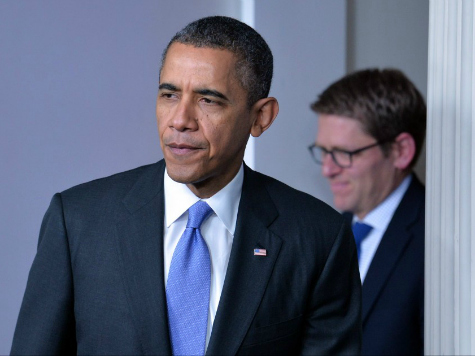
On Wednesday, White House Press Secretary Jay Carney spun wildly to avoid the evidence that the White House had manipulated the talking points of then-UN Ambassador Susan Rice regarding the Benghazi attacks of September 11, 2012.
That evidence showed that the White House told Rice that her goal on the Sunday shows would be “to underscore that these protests are rooted in an Internet video, not a broader failure of policy.” In other words, tell the public to blame YouTube, not our feckless and cowardly foreign policy, for the dead Americans prior to the 2012 election.
Carney attempted to state that the email itself wasn’t about Benghazi – it was about Middle East protests in general. That claim doesn’t hold water, given that the email was released in response to a request from Judicial Watch for documents related to Benghazi and the fact that Rice explicitly connected the YouTube videos to Benghazi.
On Thursday, nonetheless, Carney claimed that the entire issue had been politicized and ripped the investigation into Benghazi altogether. That’s nothing new for Carney, who has stated in the past that Benghazi was politicized by Mitt Romney and suggested in 2013, “This is a subject that has from its beginning been subject to attempts to politicize it by Republicans, when in fact what happened in Benghazi was a tragedy.” He added that all scandals of the Obama administration had been politicized thanks to the “rapid politicization of everything.” President Obama, of course, similarly commented that all of his scandals, from the IRS targeting conservatives to the Department of Justice targeting the Associated Press to Fast and Furious, were “phony” concoctions by an anti-Obama right wing.
Carney wasn’t the only White House official spinning the Benghazi smoking gun email this week. “Unlike those who insist on politicizing the events in Benghazi, our focus remains on ensuring that a tragedy like this isn’t repeated in Libya or anywhere else in the world,” said Bernadette Meehan of the National Security Council.
This nonsensical excuse – a scandal doesn’t matter because others are politicizing the scandal – has become a mainstay of political attempts to misdirect from political headaches. Here are the top 5 instances of that excuse from the deeply guilty:
John Kerry’s Israel “apartheid” comments. This week, Secretary of State John Kerry was caught on tape at the Trilateral Commission stating that Israel would become an “apartheid state” if it did not make concessions to the Palestinians – who had just signed a deal between the supposedly non-terrorist Palestinian Authority and the overt terrorist groups Hamas and Islamic Jihad. After the tape broke, Kerry blamed partisan politics: “I will not allow my commitment to Israel to be questioned by anyone, particularly for partisan, political purposes.” How exactly The Daily Beast, which reported the quotes, is “partisan” or “political” in its opposition to John Kerry remained unexplained, given The Daily Beast‘s well-known leftist slant.
Chris Christie’s Bridgegate. As the Christie administration in New Jersey was caught up in revelations that the governor’s office had worked with the Port Authority to punish a political opponent with lane closures on the George Washington Bridge, Christie’s allies showed up to blame partisan politics for the whole ordeal. New York Mayor Rudy Giuliani called the episode a “partisan witch hunt.” Congressional candidate Steve Lonegan said that the situation was “a bunch of political hacks trying to tear down the image of a governor who’s been successful.”
Weinergate. After Anthony Weiner revealed himself to the world via Twitter, The New York Times reported, “a more prying press corps, stricter public standards and greater partisanship have combined to make Washington oddly more puritanical than it once was.”
Hillary’s “Vast Right Wing Conspiracy.” Just a few days after Matt Drudge’s DrudgeReport.com broke the news that President Clinton had lied under oath about his affair with Monica Lewinsky, Hillary appeared on The Today Show and explained, “I do believe that this is a battle. I mean, look at the very people who are involved in this – they have popped up in other settings. This is – the great story here for anybody willing to find it and write about it and explain it is this vast right-wing conspiracy that has been conspiring against my husband since the day he announced for president.” She complained of the “intense political agenda at work here.” That did not change the fact that her husband committed perjury.
Watergate. When rumors of a break-in by political operatives at the Watergate Hotel first broke, Nixon’s political allies in Congress called it a partisan witch hunt. Rep. Edward Gurney (R-FL) said that Watergate was “one of those political wing-dings that happen every political year.” Sen. Ted Stevens (R-AK) charged that it was a “partisan” exercise to go after Nixon. Nixon himself said that the quest to go after him was “all a Kennedy deal.” That didn’t change Nixon’s complicity in bugging. And it didn’t save him.
When allegations aren’t true, simply denying them is the best tactic. Blaming partisanship for attention to scandal doesn’t justify the original scandal.
Ben Shapiro is Senior Editor-At-Large of Breitbart News and author of the New York Times bestseller “Bullies: How the Left’s Culture of Fear and Intimidation Silences America” (Threshold Editions, January 8, 2013). He is also Editor-in-Chief of TruthRevolt.org. Follow Ben Shapiro on Twitter @benshapiro.

COMMENTS
Please let us know if you're having issues with commenting.